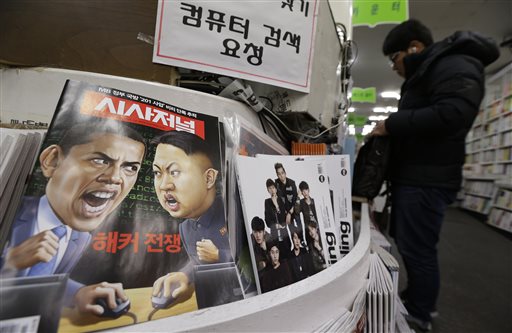3 things to know about new US sanctions on North Korea

A magazine with cartoons of U.S. President Barack Obama, left, and North Korean leader Kim Jong Un is displayed at a book store in Seoul, South Korea, Saturday, Jan. 3, 2015. AP FILE PHOTO
SEOUL, South Korea — Here are three things to know about new U.S. sanctions against North Korea over a cyberattack on Sony Pictures, whose movie depicting the fictional assassination of North Korea’s leader has infuriated Pyongyang, which denies responsibility for the cyberattack:
——
Pyongyang’s rhetoric over the weekend, which included a vow that the new sanctions and America’s “inveterate repugnancy and hostility” would not weaken the North’s 1.2-million-strong military, is probably directed as much at a domestic audience as it is at Washington.
Some North Korea watchers believe that sanctions help to insulate Pyongyang from taking responsibility for its failures, and allow Kim Jong Un, the 30-something leader who took power in late 2011 after his father’s death, to better solidify his power and bolster his domestic image as a strong leader.
Pyongyang, the argument goes, uses tension with the outside world, in general, and sanctions, in particular, to whip up always high anti-U.S. sentiment. This, in turn, allows the leadership to justify its inability to feed many of its people and the continuing push to develop nuclear bombs it says are needed to defend against Washington.
Article continues after this advertisement—–
Article continues after this advertisementThe new measures are unlikely to make much of a difference in North Korea, which has been bombarded by sanctions for decades and which has woven an obsession with self-reliance into its national psyche.
Some analysts say Washington and others have the ability, should they choose, to apply more severe financial measures to hurt the North’s leadership. But many others point out that a raft of multilateral penalties from the United Nations, as well as national sanctions from Washington, Tokyo and others meant to punish the government and sidetrack its nuclear ambitions, have done nothing to derail Pyongyang’s pursuit of a nuclear tipped missile that could reach America’s mainland.
The most recent sanctions, which target 10 North Korean government officials and three organizations, including Pyongyang’s primary intelligence agency and state-run arms dealer, will have a limited impact because North Korea will likely assign other people or organizations to take over the work of those targeted, analysts say.
—–
The measures probably won’t hurt recent efforts to improve ties between the rival Koreas.
North and South Korea have been at each other’s throats, both figuratively and literally, since the Korean Peninsula was divided at the end of World War II into a U.S. backed capitalist south and a Soviet-backed communist north.
In the decades since they were founded in 1948, the Koreas have established elaborate patterns of communicating their intentions toward each other, even as they trade bombastic rhetoric and threats.
The North’s comments over the weekend have been largely viewed in Seoul as leaving the door open for warming ties as they didn’t specifically criticize South Korea.